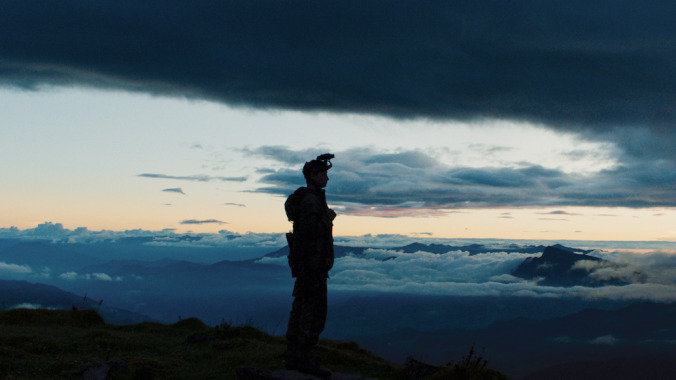Boys and girls on the precipice of adulthood kick a can around, blindfolded, playing some makeshift hybrid of soccer and Marco Polo to pass the unfilled hours. They live near an actual precipice, in a stone bunker carved into the top of a mountain and surrounded by clouds—their modest castle in the sky. By day, they perform military training exercises, but also just goof around and make out and eat mushrooms. By night, they dance around bonfires and scream toward a heaven they can almost reach out and touch. They’re somewhere in Latin America, possibly Colombia, though where exactly is never specified. For all intents and purposes, this foggy, isolated, high-altitude kingdom is Neverland. But there’s no Peter Pan around to fill their lives with meaning or magic.
Going only by code names, like Smurf and Boom Boom, the young commandos do answer to someone: They’re at the bottom of a chain of command, the lowest-ranking grunts of a mysterious guerilla group called The Organization. But they’re also just kids—horny, confused, unsupervised kids, tasked with grave responsibilities they’re nowhere near emotionally mature enough to handle. That’s the reigning contradiction, maybe the tragic tension, of the gripping Monos. Directed and co-written by Alejandro Landes (Porfirio), the film builds a whole social ecosystem around these child soldiers, quickly laying out their relationships and routines. In doing so, it shows us how their community—situated at the top of the world, and beholden to the laws of an unseen command fighting far below—is a distorted version of “ordinary” youth culture. However radicalized they may be, however backwards-socialized by their isolation and the violence of their circumstances, they’re still teenagers. They have their own dramas, their consuming crushes and grudges.
Personalities emerge, forged by a cast of largely unknown actors. We meet Lady (Karen Quintero), itchy with boredom and desire, and the sensitive, possibly non-binary Rambo (Sofia Buenaventura), whose gender identity the film never clarifies. And we’re drawn to the seething, impetuous Bigfoot, played by one-time Hanna Montana regular Moises Arias. The Monos, as these junior militants have been dubbed, have at least one serious duty cutting into their unstructured free time: They have to guard a hostage taken by The Organization, an American engineer the teens refer to as Doctora, played by the great Julianne Nicholson. In a more conventional film (or maybe just an American one), Doctora would be at the center of the action—we’d experience this story from her fraught, terrified perspective. Instead, Landes shuttles her off screen for much of the film’s first half, and mostly declines to provide her backstory; we don’t even learn the details of her kidnapping. This works to establish a troubling balance of allegiance, especially once it becomes clear that the prisoner’s survival may be zero sum, conflicting directly with that of her captors’.
Doctora seems to understand the stakes, too. And Nicholson, in a shaded and highly physical performance, communicates pangs of sympathy through her distress: a faint concern for the teenagers holding her hostage, maternal in the same way Tom Hanks was paternal in the likeminded Captain Phillips. (In one remarkable scene, she goes from bargaining with a young guard to comforting her to rejecting the girl’s carnal advances.) This is the movie’s moral and political conscience: the horror of children as weapons, and of being forced to privilege one’s own life over that of enemies too young to hold responsible. But Monos isn’t a social-issue tract, or just a lament for the beasts of no nation. It’s a fever dream of a war drama, caught halfway between realism and the hallucinatory intensity of an ancient fairy tale. Landes tells the story in mythic strokes, through grand and surreal imagery: bodies silhouetted against blue and billowy skies; nocturnal rituals of fire and smoke; and young soldiers, slathered in handmade war paint, moving in menacing formation. At times, the movie almost veers into fantasy, thanks in no small part to the boom and swell of another otherworldly score by Mica Levi (Jackie, Under The Skin).
Monos only grows more and more primal, especially once the platoon is driven off the mountain by a military counterforce. Pushed into the deep foliage below, where Doctora plots escape, the adolescent quasi-society begins to splinter and dissolve, going full Lord Of The Flies. And the movie, too, begins to break down, into an increasingly wordless jungle odyssey of bugs, rain, and bloodshed—a wilderness nightmare worthy of Joseph Conrad and Werner Herzog. It’s action moviemaking as its most thrillingly elemental, but with a troubling human dimension: the vestiges of teenage innocence glimpsed on that secluded mountain purgatory, then set ablaze in a heart of darkness.



 Keep scrolling for more great stories from A.V. Club.
Keep scrolling for more great stories from A.V. Club.